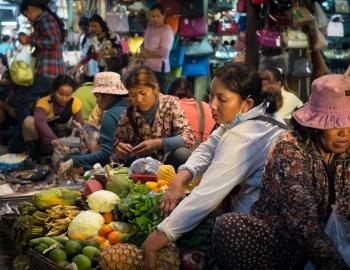Advancing gender equality and climate action: A practical guide to setting targets and monitoring progress
Advancing gender equality and climate action: A practical guide to setting targets and monitoring progress
CDKN, ODI, SNV, CARE and Mercy Corps have launched a new guide, entitled Advancing gender equality and climate action: a practical guide to setting targets and monitoring progress.
The partners created the guide because they heard a common refrain from project managers: 'we have to integrate gender into our climate project but we don't know exactly how to do it!' Advancing gender equality and climate action is geared to helping project managers develop appropriate gender-related targets and a suitable Monitoring, Evaluating and Learning (MEL) system to track achievement over time.
The guide complements CDKN's training materials, including powerpoint packs and serious fun games on gender and social inclusion in climate projects, available at: www.cdkn.org/gendertraining
More than Monitoring, Evaluating and Learning
The guide is not purely about MEL systems, though. These do not stand alone: but need to be integrated into overall climate project design and planning processes that have ambitious gender equality goals. A comprehensive approach includes:
- understanding diverse people’s needs and capabilities (Chapter 2)
- assessing gender-responsive solutions and project planning based on local people’s knowledge (Chapter 3), then
- setting appropriate gender-related targets and indicators, and ultimately preparing a MEL system to track progress and learn from implementation (Chapter 4).
Learning from experience
This guide uses rich case study examples to unpack how different organisations have:
- developed gender-responsive objectives and targets, appropriate to their sector and context
- created relevant indicators and MEL systems to track and understand progress
- managed their projects adaptively in response to emergent learning.
The featured case studies are:
- Cambodia Horticulture Advancing Income and Nutrition program (CHAIN)
- Energising Development (EnDev) Tanzania
- Promoting Sustainable Partnerships for Empowered Resilience (PROSPER - Malawi)
- Educating Nigerian Girls in New Enterprises (ENGINE)
- Enabling Andean Communities to Adapt to Climate Change (Ecuador).
The guide's authors are Mairi Dupar (CDKN/ODI) and Patricia Velasco (CDKN) with substantive contributions from: Inga Brill (SNV), Andrés Córdova (CARE Ecuador), Harko Koster (SNV), Vaidehi Krishnan (Mercy Corps), Sokundarun Lim (SNV), Jennifer Linkletter (SNV), Rik Overmars (SNV), Beza Tesfaye (Mercy Corps).
Further reading
Advancing gender equality and climate action complements a sister CDKN publication, which is also being launched at COP26, entitled Strengthening gender integration in climate finance projects by Tara Daniel.



